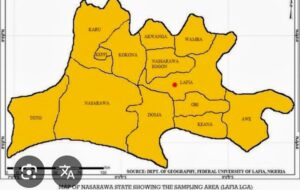

By Dada Ahmed.

Nasarawa State, with its scenic landscapes, has been home to the Egbira and Bassa ethnic groups in Toto Local Government Area. Yet, beneath its beauty lies a deep-seated conflict fueled by disputes over land, political representation, and historical grievances. The violent clashes between these communities have caused displacement and hampered development. Governor Abdullahi Sule’s administration is addressing this conflict head-on, aiming to turn this volatile situation into an opportunity for lasting peace.
Governor Sule’s approach emphasizes inclusivity and collaboration. In a high-level stakeholders’ meeting in Abuja, traditional leaders, security agencies, and community representatives deliberated on actionable steps to address the crisis. The governor underscored the urgency of resettling displaced individuals, many of whom live in dire conditions. His plan incorporates recommendations from a peace committee led by HRH Justice Sidi Muhammad Bage (rtd), Emir of Lafia, alongside innovative strategies from security experts. This holistic approach seeks not just to return displaced persons but to ensure their safe reintegration into their ancestral homes.
At the heart of the conflict are disputes over fertile farmlands, political exclusion, and chieftaincy disagreements. These issues have turned communities into battlegrounds, exacerbating tensions. Analysts suggest that clearly demarcating boundaries and fostering joint resource management could mitigate disputes. Additionally, enhancing fair representation in governance and ensuring equitable access to political offices can rebuild trust and ease electoral tensions. Historical grievances over dominance and governance must also be addressed through sincere dialogue and trust-building initiatives.
Another critical issue is the role of external actors in fueling tensions for personal or political gain. Politicians and other influencers have exploited these disputes, deepening animosities. Holding such actors accountable is essential to prevent manipulation. Furthermore, resolving chieftaincy disputes requires respecting cultural traditions and involving neutral mediators to facilitate fair resolutions. Equitable distribution of resources and inclusive development projects could serve as powerful tools for fostering coexistence and mutual prosperity.
Traditional rulers like the Ona of Toto, HRH Mohammed Umar Azaki, and the Aguma Bassa, HRH Dr. David Tukura, play pivotal roles in the peace process. Their influence can promote reconciliation, forgiveness, and mutual respect. Dr. Tukura’s call for unity reflects the urgency of the moment: “This is a time for healing and rebuilding. We must work together to ensure that all displaced persons return home and live in harmony again.” The active involvement of such leaders alongside government efforts could transform Toto LGA into a symbol of unity and shared progress.
Achieving lasting peace requires a multifaceted approach. Key strategies include fostering open communication, ensuring equitable resource allocation, strengthening governance, and establishing conflict prevention mechanisms. Governor Sule’s commitment, supported by traditional institutions and the affected communities, offers hope for breaking the cycle of violence. With sustained effort, Toto LGA could shift from being a flashpoint of ethnic tensions to a model of harmony and shared prosperity in Nasarawa State.
Ahmed Bature Idris, an indigene of the area,proffers lasting solution to the problem by identifying the need for proper profiling of returning Bassas to ascertain genuine indigenes of Toto LGA.
He warns that fraudulent claims of residency and land ownership by individuals from neighboring states have previously escalated tensions.
Idris expresses concern that without a transparent and fair verification process, peace efforts may be compromised.
He describes transparency in addressing these issues as crucial and advocated for clear documentation of all agreements reached during reconciliation efforts, with all parties
The agreement he further urges, should include the government, signing off on the terms, stressing that this approach will ensure accountability and prevent misunderstandings or misinterpretations of the agreements, which could otherwise derail progress.
Furthermore, Idris emphasizes the importance of clear communication and fairness in implementing these agreements.
He expresses optimism that ensuring adherence to the terms would help rebuild trust between the Bassas, Egbiras, and other stakeholders.
Idris, who is also a journalist,adds that addressing issues such as resource allocation, political representation, and administrative clarity will be key in fostering long-term harmony.
Ultimately, Idris believes that tackling these unresolved issues comprehensively is essential for sustainable peace in Toto LGA.
He says by addressing boundary ambiguities, curbing fraudulent claims, and ensuring fairness in governance, the state can create a solid foundation for reconciliation and development in the area.
Dada Ahmed,a former State Correspondent of NAN in Nasarawa State between 2000 and 2006, publishes The Reporters.


